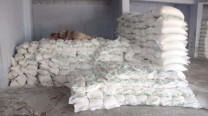Lotte Group may be angling for Kolson

Lotte Group may be angling for Kolson
Adnan Samdani, corporate strategy manager at Lotte Pakistan PTA, confirmed that the group is looking at Pakistani confectionary manufacturers but declined to name any specific firms. He did not deny that Kolson was on the group’s acquisition shortlist though he added that the deliberations were in their initial stages and the group had not yet made any decisions on the matter. The Lotte Group acquired Pakistan PTA – since renamed Lotte Pakistan PTA – in September 2009 for $500 million from AkzoNobel in the single largest foreign direct investment into the petrochemical sector in Pakistan.
Pakistan PTA produces pure terephthalic acid (PTA), which is main raw material used in the production of polyester filament yarn, polyester staple fibre PET bottles. A delegation from the group’s headquarters in South Korea visited Pakistan in January, specifically looking to expand into the confectionary sector, though it made no commitments during that visit. The group is also investing in expanding Pakistan PTA’s capacity in addition to investing $50 million in a 50MW power plant.
The Lotte Group is one of the largest industrial conglomerates in Korea, with interests ranging in industries as diverse as food products, financial services, construction, chemicals, logistics and hospitality. Expanding into Pakistan appears to one of the main planks of the firm’s strategy of increasing the size of its footprint in Asia. Executives from several of Lotte’s business lines have visited the country in recent months leading some analysts to speculate that the firm plans on expanding many of its subsidiaries into Pakistan. K.S. Sulemanji Esmailji & Sons manufactures pasta, biscuits, chips, cereals and snacks under the Kolson brand name.
The company has been in business since 1942 and was the first to manufacture pasta in Pakistan. The company is private so there is no data available on its finances or market share but it claims to be one of the leading manufacturers of breakfast cereal in the country. Should Lotte go ahead with the acquisition, it will acquire a business that has long-established relationships with suppliers as well as a distribution network that spans much of urban Pakistan. However, confectionary manufacturers in Pakistan command only a small portion of the market, with the bulk of the market being controlled by small local bakeries.
The challenge for any manufacturer is to expand the reach of its distribution network in order to be able to effectively compete with this widely dispersed array of competitors. But it also means that regardless of how much a company has expanded, there is always far more room to keep on expanding.



















COMMENTS
Comments are moderated and generally will be posted if they are on-topic and not abusive.
For more information, please see our Comments FAQ